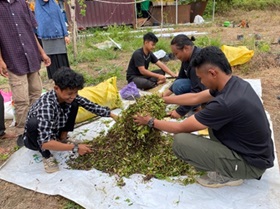Pengembangan Laboratorium Lapangan Agribisnis sebagai Unit Usaha dan Pusat Pembelajaran Agripreneurship
Development of Agribusiness Field Laboratory as a Business Unit and Agripreneurship Learning Center
DOI:
https://doi.org/10.33084/pengabdianmu.v10i2.8335Keywords:
Agripreneurship, OrganicAbstract
The development of the Agribusiness Field Laboratory (LLA) as a business unit and agripreneurship learning center aims to integrate education, research, and business practices in the agribusiness sector at the University of Muhammadiyah Kendari The development of the LLA began with the installation of a greenhouse, the creation of six NFT hydroponic units, the development of organic cultivation covering an area of 0.5 hectares, and training in the provision of organic fertilizers and botanical pesticides and vermicompost. The results obtained in the first two months of the initial production stage in the hydroponic unit were IDR 4,062,500 and from the organic garden IDR 3,584,000. Investment assessment based on NPV analysis obtained a value of 169,456,788.54. Based on the calculation results above, it can be seen that NPV> 1 so that the hydroponic business with the NFT system meets the requirements as a productive business unit that can increase partner income through campus business development programs.
Downloads
References
Aalok, A., Tripathi, A., Ecology, P.S.-J. of H., 2008, U., 2008. Vermicomposting: A better option for organic solid waste management. Journal of Human Ecology , 24, 59–64. https://doi.org/10.1080/09709274.2008.11906100
Bairwa, S., Lakra, K., Kushwaha, S., … L.M.-I.J. of, 2014, undefined, 2014. Agripreneurship development as a tool to upliftment of agriculture. Citeseer 4. https://www.researchgate.net/publication/275152722_Agripreneurship_Development_as_a_Tool_to_Upliftment_of_Agriculture
Bannor, R., Arthur, K.K., 2024. A systematic review and bibliometric analysis on agribusiness gaps in emerging markets. Research in Globalization 8. https://doi.org/https://doi.org/10.1016/j.resglo.2024.100214
Business, K.C.-I.J. on R.T. in, 2019, undefined, n.d. Agripreneurship: A tool for economic development of India in the new millennium. ejournal.lucp.net. http://dx.doi.org/10.34293/commerce.v11i4.6662
David, W., Ardiansyah, 2017. Organic agriculture in Indonesia: challenges and opportunities. Organic Agriculture 7, 329–338. https://doi.org/10.1007/S13165-016-0160-8
Fani, D., Henrietta, U., Oben, E., Dzever, D., Obekpa, O., Nde, A., Sani, M., Annih, M., Martin, D., 2021. Assessing the performance and participation among young male and female entrepreneurs in agribusiness: A case study of the rice and maize subsectors in Cameron. Sustainability 13. https://doi.org/https://doi.org/10.3390/su13052690
Magagula, B., practice, C.T.-D. in, 2020, undefined, 2020. Youth perceptions of agriculture: influence of cognitive processes on participation in agripreneurship. Taylor & Francis, 30, 234–243. https://doi.org/10.1080/09614524.2019.1670138
Otache, I., 2017. Agripreneurship development: a strategy for revamping Nigeria’s economy from recession. African Journal of Economic and Management Studies 8, 474–483. https://doi.org/10.1108/AJEMS-05-2017-0091/FULL/HTML
Rao, M., India, K.K.-M. in, 2016, undefined, 2017. Agripreneurship for sustainable growth in agriculture and allied sectors: A conceptual model. researchgate.net. https://doi.org/10.1108/AJEMS-05-2017-0091
Sharma, N., Acharya, S., Kumar, K., … N.S.-J. of S. and, 2018, U., 2019. Hydroponics as an advanced technique for vegetable production: An overview. J Soil Water Conserv 17, 364–371. https://doi.org/10.5958/2455-7145.2018.00056.5
Slamet, A.S., Nakayasu, A., Bai, H., 2016. The Determinants of Organic Vegetable Purchasing in Jabodetabek Region, Indonesia. Foods 2016, 5, 85 5, 85. https://doi.org/10.3390/FOODS5040085
Tripathi, R., Research, S.A.-G.J. of A., 2015, undefined, n.d. Rural development through Agripreneurship: A study of farmers in Uttar Pradesh. g-fras.org 2, 534–542. https://www.g-fras.org/phocadownload/userupload/mahesh64/Agripreneurshipinup.pdf

Downloads
Published
How to Cite
Issue
Section
License
Copyright (c) 2025 Hartati Hartati, Sitti Rahma Ma'mun, Muhammad Nur, Hasbullah Syaf

This work is licensed under a Creative Commons Attribution-ShareAlike 4.0 International License.
Authors who publish with this journal agree to the following terms:
- Any article on the copyright is retained by the author(s).
- Author grant the journal, right of first publication with the work simultaneously licensed under a Creative Commons Attribution License that allows others to share work with acknowledgment of the work authors and initial publications in this journal.
- Authors are able to enter into a separate, additional contractual arrangements for non-exclusive distribution of published articles of work (eg, post-institutional repository) or publish it in a book, with acknowledgment of its initial publication in this journal.
- Authors are permitted and encouraged to post their work online (e.g., in institutional repositories or on their websites) prior to and during the submission process, as can lead to productive exchanges, as well as earlier and greater citation of published work.
- The article and any associated published material is distributed under the Creative Commons Attribution-ShareAlike 4.0 International License










